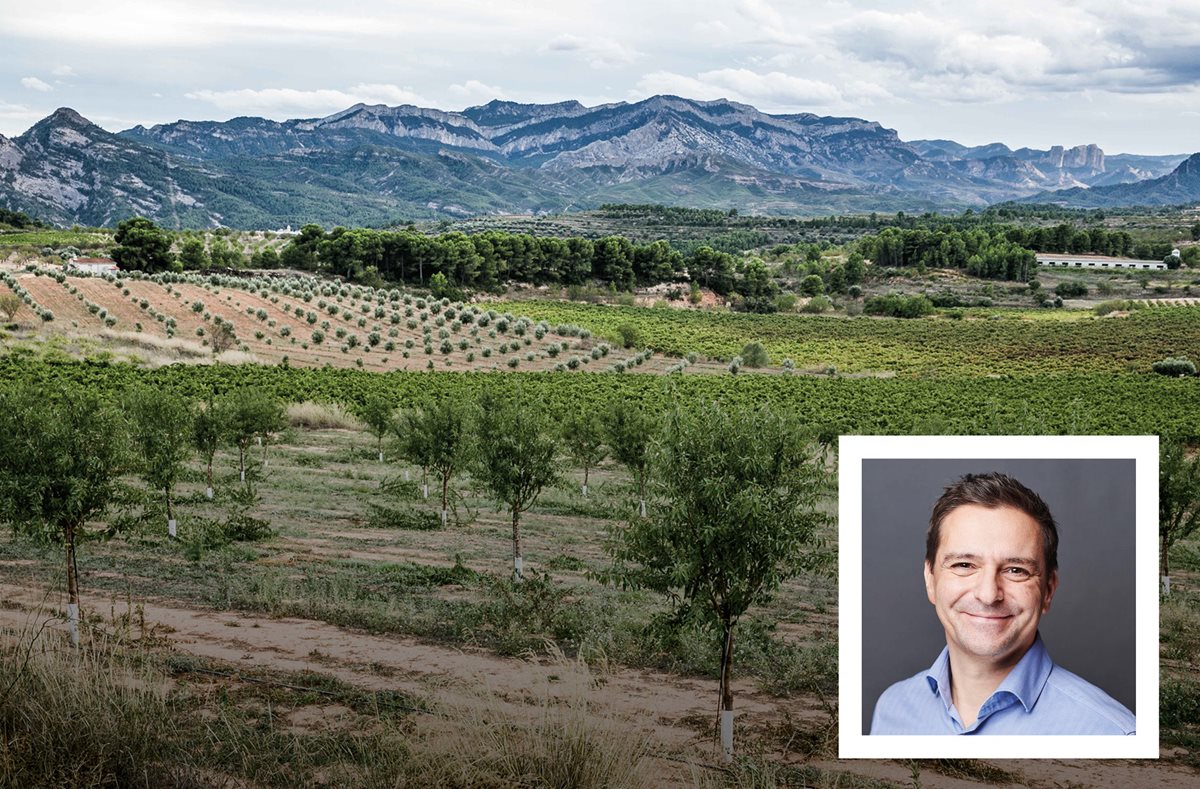Eric Derie, Global Head of Coffee at Alpro, speaks to 5THWAVE about Alpro’s ambitious 2025 sustainability pledge, why coffee shops are so important to the plant-based movement, and how Starbucks has profoundly shaped global coffee culture as we know it today

Main image: Almonds grown in the Mediterranean,sourced by Alpro | Inset: Eric Derie, Global Head of Coffee, Alpro | Photo credits: All images courtesy of Alpro
By 2050, the world will need to feed 10 billion people. Nurturing the world’s growing population will mean taking extra care to minimise the environmental impact of farming practices, sourcing strategies and production processes.
Switching to plant-based products is one powerful way consumers are reducing their environmental impact – and maintaining healthy lifestyles at the same time.
“More and more consumers are considering flexitarian, vegetarian and vegan diets – or at least consuming more plant-based foods – as part of a wider global trend” says Eric Derie, Global Head of Coffee at Alpro.
Since being founded in 1980, pioneering healthy eating and sustainable living have been at the heart of
Alpro’s mission. Alpro first
certified as a B Corp in 2018, and has since increased its score by 20 points to reach 106.4 today.
In 2020, Alpro embarked on an ambitious sustainability journey to slash its environmental impact across carbon emissions and resource consumption and waste. The ‘
Feeding the Future With Plants’ pledge commits Alpro to reducing its operational water footprint per product by 60%, increasing the proportion of renewable energy used, from sources including solar panels and biogas, to 50%, and reducing operational greenhouse gas emissions by 30% per kilo of product – all by 2025.
“Consumers are looking for variety and new experiences, they want to be inspired”
Alpro has also pledged to increase the proportion of its recyclable packaging from 76% today to 100% in 2025. As part of its broader sustainability efforts, the brand already sources most of its ingredients from Europe, including almonds grown in the Mediterranean, and over half of the soya it uses.
“From Alpro’s inception more than 40 years ago, the brand has always championed conscious choices that are good for people and good for the planet,” says Derie.
Planting the seeds of beverage innovation
Gone are the days when plant-based products served as mere substitutions for their animal counterparts. In fact, Derie notes that as consumers have become more educated on plant-based foods over the last 40 years, they are now actively incorporating a new vocabulary of plant-based flavours into their diets – with coffee shops providing the ideal platform for experimentation.
“Consumers are looking for variety and new experiences, they want to be inspired. Coffee and coffee shops are a huge part of this for Alpro,” says Derie. “There are so many amazing recipes popping up in coffee shops around the world. Customers can enjoy a hint of almond or coconut in their coffee, or opt for a more neutral taste with oat or soy.”
This dynamic is one of the main reasons why coffee shops are crucial sales channels for Alpro, as venues where consumers can discover, try and experiment with plant-based products.
On that front, Alpro is expanding from its core western Europe customer base into new markets where the plant-based revolution is taking hold. Notably, Derie identifies burgeoning coffee shop markets in Russia and Asia as key growth areas.
“The UK and Germany have traditionally been the largest markets in the Alpro world. However, there is an immense community of coffee professionals and consumers in so many other parts of the world: Asia, Russia, Central Europe, the Middle East, who are keen to experiment with plant-based ingredients,” says Derie.
.jpg.aspx?lang=en-GB&width=700&height=369)
Over half the soya Alpro sources is grown in Europe
Starbucks at 50
As a brand with a 40-year history of spreading the plant-based approach, Alpro has played a key role in shaping the global coffee shop community we know today. When it comes to championing the coffee shop industry that is so intrinsic to his brand’s success, Derie is unequivocal on the importance of Starbucks’ role over the past half-century.
“Starbucks has profoundly shifted the way that the world consumes coffee. Over those 50 years, they’ve taken a product that was often regarded as a commodity and turned it into a premium experience enjoyed the world over. They’ve brought inspiration and innovation to the industry.”
As for the next 50 years, Derie acknowledges the many challenges are facing the global coffee industry, but remains optimistic it can maintain a positive trajectory towards greater quality, environmental sustainability, and inclusivity.
“I think a lot of innovation will come from automation. Technology is already cultivating greater access to premium and specialty coffee. However, I believe the appeal of coffee shops and enjoying a coffee with friends will remain a fundamentally human aspect of the hospitality industry in the future,” he says.
The intrinsic role of coffee shops as community hubs and forums for experimentation is no doubt one of the industry’s strongest assets, and one which has seen coffee shops thrive as essential parts of daily routines throughout the world. With coffee shops carrying the torch for the plant-based movement, too, the future of the industry as a progressive global influence looks secure.
This article was first published in Issue 7 of 5THWAVE magazine.
Subscribe to 5THWAVE to receive each edition in print and digitally or sign up to our newsletter and be the first to read the latest articles and updates on World Coffee Portal research
